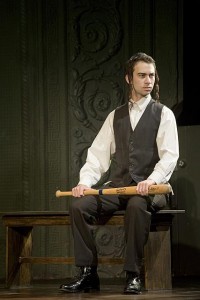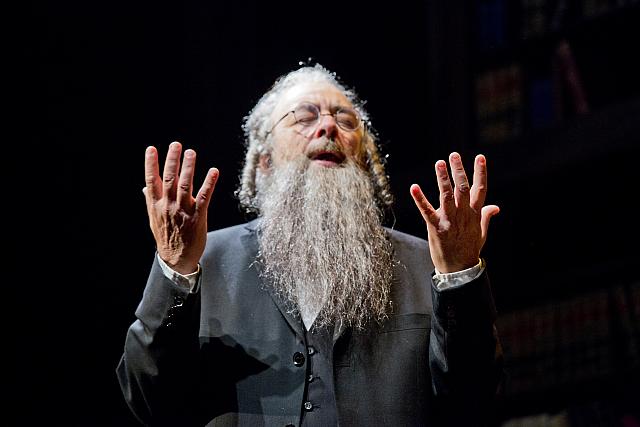Theater Review: Chaim Potok’s “The Chosen” — Brought Memorably to Life on Stage
The agile hand of adaptor and director Aaron Posner has given us a production of Chaim Potok’s novel The Chosen that our children and grandchildren must see.
The Chosen by Aaron Posner and Chaim Potok. Based on the novel by Chaim Potok. Directed by Posner. Produced by Barrington Stage. At the Boyd-Quinson Mainstage, Pittsfield, MA, through August 3.
By Roberta Silman.
When The Chosen was published in 1967, it soon became read not only in Hebrew schools and synagogue book groups but all over the country. As Publishers Weekly put it then, “Mr. Potok is writing about two fathers and their sons . . . in a way that will ring just as true in Iowa as in Brooklyn.” Although New Yorker readers were beginning to read stories by Isaac Bashevis Singer, this was the first time a novel about Orthodox Jews had gained such a wide audience.
Its appeal comes from its very specific look at the conflicting ideals of two Jewish fathers in Williamsburg (a section of Brooklyn) from 1944 to 1948 and how their differing ideas influence the next generation yet create a unique and touching bond. What I remember most about reading The Chosen when I was a young mother was the tenderness with which Potok told his story; here was a man trained as a rabbi who could see all sides of an age-old story and whose prose was a pleasure to read—graceful, yet compelling. And although he was writing about conflicts within a very small group of Jews, the play resonated through the larger community because of the universal questions it was not afraid to ask—questions that plagued and shocked the whole world as people of every ethnic group absorbed the horrible facts of The Holocaust.
Potok’s The Chosen was shaped into a play back in 1999 by Aaron Posner and Potok himself; since Potok’s death in 2002, it has undergone some changes, so that the script that premiered at Barrington Stage Sunday night is the Revised Edition and, probably, the final one. The story is as moving in play form as it was as a book, and this new production is splendid, each detail of scenery and staging well thought out, giving the story a sharpness and an urgency not really possible in a novel. What is most surprising is the device of the narrator. So often a voice-over deadens the material, but here, an older Reuven Malter narrates events as they happened and, because of the distance of age and time, the approach gives the play an added dimension. Actually Reuven resembles the Stage Manager in Wilder’s great play Our Town, his wryness a wonderful lens through which to tell the sometimes bizarre events that revolve around the young Reuven and his Chasid friend, Danny Saunders.
What those events add up to is a coming-of-age story of two Jewish boys who come from very different homes: Reuven, whose mother died when he was young, lives with his father David Malter, a passionate man with strong convictions, a secular Jew and a Zionist although he teaches in a Jewish school, and not at all incidentally, also battling heart disease. And Danny, the son of Reb Saunders who is not only a Hasid but a tzaddik, a leader of a religious sect from Russia who regards Jews who are not his followers apikorsim, “Bad Jews Unholy. Unclean.” The trajectory of the plot deals with how their paths intersect (starting with a baseball injury) and the evolution of their unlikely friendship. The play’s basic themes run deep—how fathers love their sons, how fathers guide their sons, and how they discover, both fathers and sons, what it means to live in an increasingly complex world that has been utterly changed by the Second World War and the facts, now being revealed, of The Holocaust.
One of the best aspects of this play is that these large questions are treated with a light touch, yet they underscore all that is happening. That opposing ideas have merit—a point made at the beginning and end of the play: “Both these and these are the words of the living God” from the Talmud—is as relevant now as it was in 1948 when the play is set and in 1967 when the book first came out. In this coming-of-age story, kids are not obsessed with sex and girls but ask large questions that cannot be answered and discover that the very asking is what matters. In one of the best scenes in the play, Scene 3 in Act 2, Reuven tries to get his father to slow down and rest more. After blowing up, his father finally sighs and says,
Do you know what the Rabbis tell us God said to Moses when he was about to die?
REUVEN. No.
MALTER. God said: “You have toiled and labored and now you are worthy of rest.” Worthy of rest. We do not live forever. We live less than the time it takes to blink an eye. So then why do we live? What value is there to our life if it is nothing more than the blink of an eye? The blink of an eye is nothing. But the eye that blinks, now that just might be something. The span of a life is nothing, but the man who lives may be something if he fills his life with meaning. Meaning is not automatically given to life. We must choose. And if we choose to fill our lives with meaning, then perhaps when we die we too will be worthy of rest. And that is why I am doing what I am doing. You understand?
[And a little later]: But I must do these things or my life would be meaningless. Merely to live, to exist—what sense is there in that? A fly also lives.
And finally, the actors. Each was wonderful: Richard Topol as the older Reuven Malter and other minor characters; then two young men who brought these teenagers to life in a remarkable, never condescending way: Jeff Cutler as the young Reuven Malter and Ben Rosenbach as Daniel Saunders; Richard Schiff, who evoked the difficult Reb Saunders in all his extreme behavior; and, my favorite, Adam Heller as David Malter, in some ways the most complicated character in this play. All absolutely terrific and poignant in this drama about growing up intellectually, where respect and dignity are given their due by its true star, Aaron Posner, a writer and director thoroughly in command of material that could easily have become dated but whose guiding hand has made possible a production of The Chosen that our children and grandchildren must see.
Roberta Silman is the author of Blood Relations, a story collection; three novels, Boundaries, The Dream Dredger, and Beginning the World Again; and a children’s book, Somebody Else’s Child. Her newest short story “The Sugar Road” can be found in the Digital Edition of The American Scholar. She writes regularly for The Arts Fuse and can be reached at rsilman@verizon.net.


